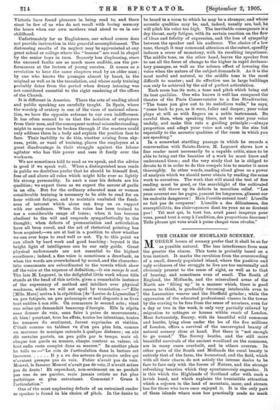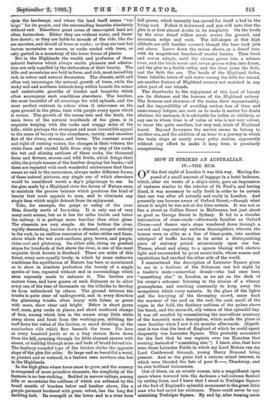M ODERN lovers of scenery prefer that it shall be so
far as possible natural. The less interference from man the greater the charm. This taste is probably based on a true instinct. It marks the revulsion from the overcrowding of a small, densely populated island, where the positive and ugly evidences of the struggle to live are too universally and Obviously present to the sense of sight, as well as to that of hearing, and sometimes even of smell. The South of England, the Midlands, and the mineralised areas of the North are "filling up" in a manner which, there is good reason to think, is gradually becoming intolerable even to the Lancashire weaver and the Sheffield grinder ; while the oppression of the educated professional classes in the towns by the craving to be free from the sense of numbers, even for a day or two in the week, is only very partially relieved by migration to cottages or houses within reach of London. Most fortunately, Surrey, with its beautiful wild common and heaths, lying close under the lee of the five millions of London, offers a survival of the uncorrupted beauty of natural scenery close at hand. But there is "not enough to go round." The Surrey heaths, and the still more beautiful survivals of the ancient woodland on the commons, are in many cases overbuilt, and in others overrun. In other parts of the South and Midlands the rural beauty is entirely that of the farm, the homestead, and the field, which with all their charm do not satisfy the intense desire te be face to face only with the forces of Nature, and the strange refreshing beauties which they spontaneously engender. It is this which the Highlands of Scotland offer with such a lavish hand, and which explains the irresistible attraction which a sojourn in the land of mountain, moor, and stream has for those who have once enjoyed it. It is the only part of these islands where min has practically made no mirk
upon the landscape, and where the land itself seems "too large" for its people, and the surrounding beauties absolutely Without end. Elsewhere great areas of unoccupied land are often featureless. Either they are without water, and there- fore desert ; or they are liable to inroads of the tide, like the sea marshes, and devoid of trees or rocks ; or they are vast but barren mountains or moors, or rocks unclad with trees, or only garbed in a monotony of the lower forms of plants.
But in the Highlands the wealth and profusion of those nntural features which always excite pleasure and admira- tion are only equalled by the elaboration of their beauty. The hills and mountains are bold in form, and rich, most incredibly rich, in colour and natural decoration. The climate, mild and often wet, encourages the natural growth of trees, while the rocky soil and northern latitude keep within bounds the minor and undesirable growths of thicket and brambles which often accompany such conditions elsewhere. The heather, the most beautiful of all coverings for wild uplands, and the most perfect contrast in colour when it intervenes on the open ground in the glens, tints with purple every space which it covers. The growth of the rowan tree and the birch, the main trees of the natural woodlands of the glens, is in exquisite keeping with the rocks and craggy sides of the hills; while perhaps the strongest and most irresistible appeal to the sense of beauty is the abundance, variety, and ceaseless flow of the rivers, streams, and burns. The constant sound and sight of rushing waters, the changes in their volume, the white foam and crystal falls from step to step of the rocks, the wet and shining surfaces of these rocks, the thousand ferns and flowers, mosses and wild fruits, which fringe their sides, the purple masses of the heather draping the banks,—all these are repeated with such wonderful exuberance that there seems no end to the recurrence, always under different forms, of these natural pictures, any single one of which elsewhere would be considered worth a day's pilgrimage to see. In the glen made by a Highland river the forces of Nature seem to maintain the precise balance which produces the kind of beauty that most appeals to man, and to eliminate any single item which might detract from its enjoyment.
Take, for example, the gorge or valley of the river Shin, directly north of Invershin. It is only one of very many such scenes, but as it lies for miles beside and below the railway, it is perhaps more familiar than other glens. The elements are very simple. At the bottom the river, rapidly descending, hurries down a channel, scooped entirely in the rock, in an endless succession of water-slides and foam, above which the wet rock-surfaces, grey, brown, and purple, shine cool and glistening. On either side, rising on gradual slopes for hundred's of feet above the river, is one of the most exquisite birch forests in Scotland. There are miles of this forest, every acre equally lovely, in which by some unknown conditions the equilibrium of Nature has been so maintained- as to show in absolute perfection the beauty of a single species of tree, repeated without end in surroundings which seem expressly made to enhance it. The birches are mature trees, and have grown at such distances as to allow, every one of the tens of thousands on the hillsides to develop its form unhindered by others. The ground between the trunks is quite clear of undergrowth, and in every direction the glistening trunks, often hoary with lichen or green with moss, show clear and bright. Below is short green turf, moss, grey rocks in places, and short scattered clumps of ' fern, among which late in the season stray little white sheep shorn and fresh from the washing-pen, nibbling the tart down the vistas of the birches, or stand drinking at the numberless rills which flow beneath the trees. For here at every hundred yards or so a tiny stream flows down from the hill, coursing through its little channel strewn with stones, soaking through moss and beds of broad-leaved iris. The feathery-rounded tops of the birches clothe the opposite slope' of the glen for Miles. go large and so beautiful a' woOd, so planted and so watered, is a feature seen nowhere else but in the Highlands.
'In the high glens where trees cease to grow, and the scenery is cotnposed of more primitive elements, the simplicity of the features is no less striking. Bedded in narrow valleys, among hills or mountains the outlines of which are softened by the- broad mantle of bracken below and heather above, like a purple garment bordered with green velvet, lies the long flat darkling loch. Its overspill at the lower end is a river born
full grown, which instantly has carved for itself a bed in the living rock. Follow it downward, and you will note that the glen is at first almost Arctic in its simplicity. On the levels by the river dwarf willow scrub covers the ground, and mountain sedge and rush. The hill-slopes at this high altitude are still heather covered, though the bare rock juts out above. Lower down the rowan shows, as a dwarf tree, with its magnificent bunches of scarlet berries. Then birch and rowan mingle, until the stream grows into a salmon 'river, and the birch scrub and rowan groves widen into forest, and the glen to a fertile valley, and the river joins the firth, -and the firth the sea. The beads of the Highland firths, these lakelike inlets of salt water among the hills far inland, are another feature of Highland scenery not matched in any other part of our islands.
The drawbacks to the enjoyment of this land of beauty are its distance and the horrors of the Highland railway The fewness and slowness of the trains, their unpunctuality, and the impossibility of avoiding useless loss of time and unnecessary fatigue, are such as to make it matter for doubt whether, for instance, it is advisable for ladies or children, or any one to whom time is of value or who is not very robust, to incur the quite needless, but very real, trials of Highland travel. Beyond Inverness the service seems to belong to another era, and the addition of an hour to a journey in which the train stops at nearly every petty station, apparently without any effort to make it keep time, is peculiarly exasperating.



































 Previous page
Previous page